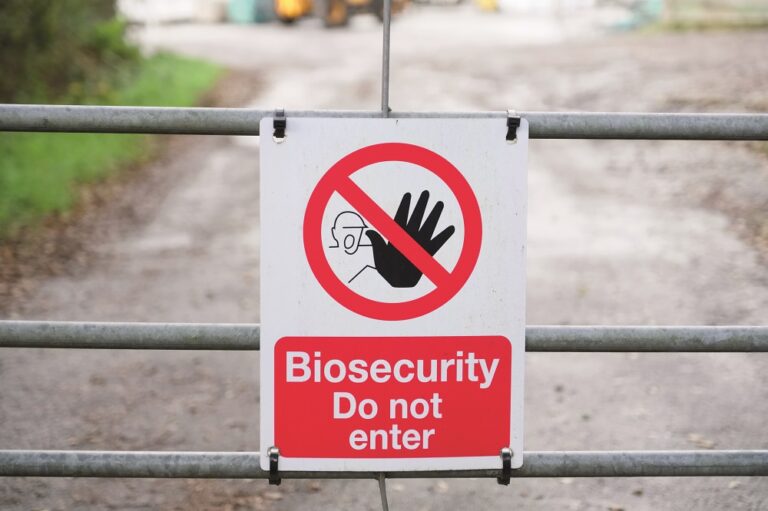There is no room for complacency on avian influenza, authorities warn, as new cases spring up across Europe
When the authorities in Northern Ireland confirmed in January an investigation had begun into an outbreak of a notifiable disease in County Fermanagh, it stoked fears that the case of avian influenza on a PD Hook unit in Suffolk that resulted in the cull of 28,000 birds last December would not be an isolated incident.
A spokeswoman for the agriculture department Daera told Poultry Business the authorities had been alerted following suspiciously high mortality in the flock of broilers.
On 15 January, Daera said the disease had been identified as non-notifiable avian influenza H6N1. This is a less serious strain of influenza, which thankfully did not require further action.
But elsewhere in Europe, avian influenza has firmly taken hold this winter, with dozens of cases of highly pathogenic AI confirmed in the past month causing huge disruption to the poultry trade.
Perhaps most significantly, one of the biggest poultry producers in the region, MHP, has had its export business temporarily disrupted, after the European Union suspended imports of poultry meat from Ukraine. The decision followed an outbreak of highly pathogenic avian influenza in the Vinnytsia region of Ukraine, a major poultry producing area that is home to MHP, the largest poultry producer in the country that exports large volumes of poultry to the EU.
A spokesperson for MHP said it was “undertaking all necessary measures to prevent potential outbreaks at all MHP’s poultry production sites. We are also assisting all poultry producers, mainly egg layers, in the Vinnytsia region strengthening their biosecurity.”
Exports to the EU were suspended on 22 January on the advice of the EU’s director general for health and food safety, who cited Article 9 of Regulation (EC) No 798/2008. Until the country is certified free of avian influenza, the Ukrainian Veterinary authorities can no longer certify poultry imports into the EU.
“MHP continues to operate as usual, commencing all necessary steps as it is dictated in its export diversification strategy, which has been enacted by the management,” said a spokesperson in a statement. “MHP continues to adhere to the best available quality and biosecurity standards and sells its products both locally and to countries, where the export ban is not applicable.
“Currently, the state veterinary authorities of Ukraine are in close cooperation with EU authorities in order to agree on and undertake all steps necessary to resolve this issue and to finally agree on compartmentation, which has not been ratified officially.”
Ukrainian officials are attempting to re-open trade routes as soon as possible. Writing on Facebook, the Ukrainian Deputy Minister of Economic Development, Trade and Agriculture, Taras Kachka, said the EU decision to suspend poultry meat imports from Ukraine was premature.
“The EU decision to restrict the import of poultry meat due to the case of bird flu in Vinnytsia region is much stricter than it should be. Nevertheless, we are actively and jointly working to quickly adjust this decision,” he wrote.
Separately, the EU has stepped up other protective measures, after multiple cases of highly pathogenic avian influenza (HPAI) H5N8 were confirmed in four member countries, Poland, Slovakia, Hungary and Romania.
The virus, likely introduced by wild migratory birds which can carry it during their seasonal movements, was first reported in Poland on 31 December 2019. It has caused a total of 16 outbreaks of HPAI in poultry farms, affecting a variety of poultry species – ducks, geese, turkeys, and laying hens.
The measures aim at protecting the rest of the EU and third countries ensuring continuation of safe trade without jeopardising the sanitary status of the EU. Such decisions are usually recognised by third countries, which import from non-affected parts of the respective Member State and the rest of the EU. So far all affected countries have taken all necessary measures, the EC said in a statement.
According to data available on TRACES, GB has not imported any live birds or eggs from the areas surrounding these outbreaks in the last few weeks.
However, British producers must remain vigilant, Defra said. Although these outbreaks in Poland, Slovakia, Romania and Hungary are the first reports of HPAI in Europe so far this winter (in either domestic poultry or wild birds), this cannot be taken as reassuring regarding the risk for incursions to UK, Defra said.
Due to the lower numbers of H5 HPAI outbreaks observed in 2018/19, there may now be more limited immunity in the native wild bird population to H5 viruses, with a large susceptible population of hosts in the form of juvenile birds migrating to the UK every autumn.
Defra recommended all poultry keepers stay vigilant and make themselves aware of the latest information on www.gov.uk, particularly about recommendations for biosecurity and how to register their flocks.

Previous ArticleEnvironment Bill must not compromise food supply, farmers say
Next Article Healthy minds
Chloe Ryan
Editor of Poultry Business, Chloe has spent the past decade writing about the food industry from farming, through manufacturing, retail and foodservice. When not working, dog walking and reading biographies are her favourite hobbies.

